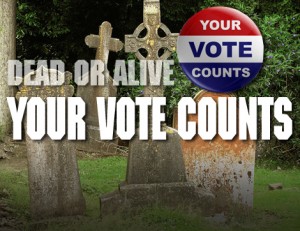By Pat Shannan
The names of as many as 18,000 dead people are still on the voting rolls in New Hampshire, and an investigative reporter has proven how any of these dead people could easily vote—and some may have done so in the January Republican primary.
A private $50,000 donation to Project Veritas financed the video production exposing the simplicity of voter fraud in a state that does not require voters to show identification prior to obtaining a ballot at the poll booths. The video is now being seen worldwide on the Internet and demonstrates the pitfalls of an election with no ID requirement.
Following graduation from Rutgers University, James O’Keefe, 26, founded the non-profit organization Project Veritas and immediately began to gain national notoriety with investigations exposing corruption and malfeasance in major taxpayer-funded institutions like ACORN, Planned Parenthood, National Public Radio and Medicaid. Even though O’Keefe is viewed by the people as a champion for truth and fairness, there are many in Washington that would like to see him prosecuted.
On Jan. 10, at polling stations in Manchester and Nashua, N.H., O’Keefe filmed mock voters requesting and receiving ballots by simply mentioning the name of a recently deceased person. However, in order not to break the law, the recipients did not cast the ballots after obtaining them—each saying, “I left my ID in the car”—and handing it back to the poll worker.
Without exception, the attendant replied with the quick explanation that no ID is required in New Hampshire, but the mock voter walked away anyway without further action or confrontation. The necessary proof was already recorded, and as each ballot was requested for the deceased person on the video, his name, date of birth and actual death date is superimposed on the screen, illustrating how easily a dead person can vote in an election.
Some of the people had died in their 90s, but because no birth date is shown on the voting records, it was no trouble for a 30-year-old to get their ballots.
At the end of the video, O’Keefe interviewed Ward Moderator Ryk Bullock and asked how it is that the names of dead people could not be used by others when the system does not require one to identify himself. “In theory, it could happen,” Bullock replied, but quickly added that when people die they are removed from the voter checklist “in a matter of days.”
This being true, the few names of people used by Project Veritas who had actually died on Dec. 31, 2011 might be excused for slipping by only 10 days later. But other examples showed Bullock’s assertion to be way off target.
For instance, Robert Beaulieu died Oct. 13, 2011; Reynold Caron died Oct. 14, 2011; Joseph Boucher died Nov. 26, 2011; George Darcy died on Dec. 2, 2011; Earnest Chavenelle died Dec. 12, 2011; and Thomas McCarron on Dec. 14, 2011. Yet the voting ballots of all of these elderly men were readily handed to young people simply for the asking.
Even Bullock admitted to reporters later that O’Keefe had shown “the worst in our system.”
——
Pat Shannan is a contributing editor of American Free Press. He is also the author of several videos and books including One in a Million: An IRS Travesty, I Rode With Tupper and Everything They* Ever Told Me Was a Lie. All are available from FIRST AMENDMENT BOOKS. Call 1-888-699-6397 toll free to charge.
Pat Shannan is a contributing editor of American Free Press. He is also the author of several videos and books including One in a Million: An IRS Travesty, I Rode With Tupper and Everything They* Ever Told Me Was a Lie. All are available from FIRST AMENDMENT BOOKS. Call 1-888-699-6397 toll free to charge.
